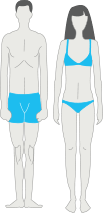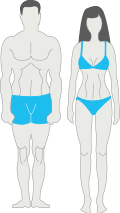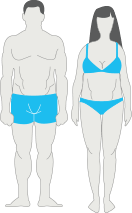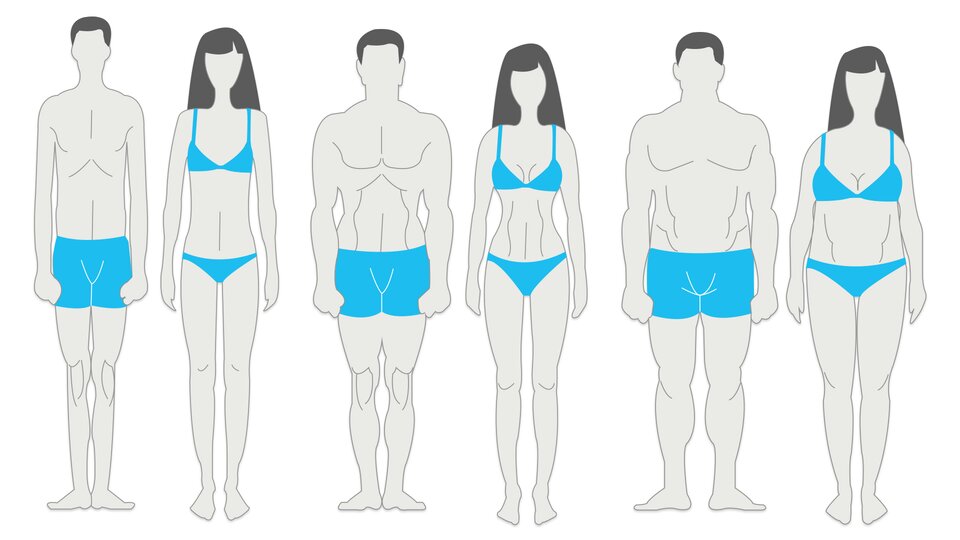Chasing a fitness or physique goal? Looking at how you eat and exercise right now are crucial parts of starting off right. So is knowing your body type.
Here’s why it’s important: Knowing your body’s natural tendencies can help you work with your body, rather than against it. That way, you can customize your nutrition and exercise plan to fit your needs and set realistic goals to help you succeed.
Take our test to find out your body type, your ideal workout style and programs, and the best supplements for your goals!
You are primarily an endomorph.

 Endomorph:
Endomorph:  Mesomorph:
Mesomorph:  Ectomorph:
Ectomorph:
Your answers indicate you are an endomorph. This can mean you build muscle easily, but might struggle to keep off body fat. Here’s what that means for your nutrition and training:
- Get your heart pumping and stay active every day.
- Lift moderate weights with short rests and a quick training pace.
- To lose fat, use a calorie calculator to help you establish a caloric deficit.
- Avoid junk food if weight loss is your goal.
To learn more about how to train for your specific body type, check out the guide, “Training Tips to Match Your Body Type.” Here are your next steps to train for your body type:
1. Pick a high-energy workout plan.
A fast and sweaty workout program will help you control your weight while holding onto muscle. Here are the most popular ones from BodyFit:
2. Calculate your macronutrient ratio.
Looking to dial in your nutrition for weight control and maximum energy? Consider tracking your macros. These are the amounts of protein, fats, and carbohydrates (as well as alcohol) making up your diet. Paul Salter, RD, shows you how to set them for your goal in the article, “Macronutrient Calculator: Find Your Macro Ratio for Flexible Dieting and IIFYM.”
3. Learn about the best fat-loss supplements.
Supplements can help you accelerate your results once you have your calories and training in place. Krissy Kendall, Ph.D., shares her recommendations in the article, 5 Ways to Up Your Fat-Loss Supplement Game.”
4. Join a fitness community.
For over 10 years, members of BodySpace have been helping each other build their best bodies, regardless of their background or body type. Join a fitness community that’s over 2 million people strong!
You are primarily an endomorph.

 Endomorph:
Endomorph:  Mesomorph:
Mesomorph:  Ectomorph:
Ectomorph:
Your answers indicate you are an endomorph. This can mean you build muscle easily, but might struggle to keep off body fat. Here’s what that means for your nutrition and training:
- Get your heart pumping and stay active every day.
- Lift moderate weights with short rests and a quick training pace.
- To lose fat, use a calorie calculator to help you establish a caloric deficit.
- Avoid junk food if weight loss is your goal.
To learn more about how to train for your specific body type, check out the guide, “Training Tips to Match Your Body Type.” Here are your next steps to train for your body type:
1. Pick a high-energy workout plan.
A fast and sweaty workout program will help you control your weight while holding onto muscle. Here are the most popular ones from BodyFit:
2. Calculate your macronutrient ratio.
Looking to dial in your nutrition for weight control and maximum energy? Consider tracking your macros. These are the amounts of protein, fats, and carbohydrates (as well as alcohol) making up your diet. Paul Salter, RD, shows you how to set them for your goal in the article, “Macronutrient Calculator: Find Your Macro Ratio for Flexible Dieting and IIFYM.”
3. Learn about the best fat-loss supplements.
Supplements can help you accelerate your results once you have your calories and training in place. Krissy Kendall, Ph.D., shares her recommendations in the article, “5 Ways to Up Your Fat-Loss Supplement Game.”
4. Join a fitness community.
For over 10 years, members of BodySpace have been helping each other build their best bodies, regardless of their background or body type. Join a fitness community that’s over 2 million people strong!
You are primarily a
mesomorph.

 Endomorph:
Endomorph:  Mesomorph:
Mesomorph:  Ectomorph:
Ectomorph:
Your answers indicate you are a mesomorph. This can mean you have a naturally fit build and can gain muscle and burn fat more easily than other body types. Here’s how it can impact your exercise and nutrition:
- Strength train fairly often, for workouts lasting 45-60 min.
- Train with moderate to heavy weights at a moderate pace, without resting too long between sets.
- Play sports and/or do cardio on a regular basis for health and energy.
- Stick to a healthy diet to stay lean and muscular and watch for slow-creeping fat gains
1. Pick a muscle-building workout plan.
A mesomorph can handle high volume and heavy weights. Push yourself in the gym with one of these popular programs from BodyFit:
2. Calculate your macronutrient ratio.
Looking to gain muscle? Lean out? Either way, consider tracking your macros. These are the amounts of protein, fats, and carbohydrates (as well as alcohol) making up your diet. Paul Salter, RD, shows you how to set them for your goal in the article, “Macronutrient Calculator: Find Your Macro Ratio for Flexible Dieting and IIFYM.”
3. Learn about the best weight-gain supplements.
Supplements can help you accelerate your muscle-building and fat-loss results once you have your calories and training nailed down. Krissy Kendall, Ph.D., shares her recommendations in the article, “8 Proven Supplements for Muscle Growth and Strength.”
4. Join a fitness community.
For over 10 years, members of BodySpace have been helping each other build their best bodies, regardless of their background or body type. Join a fitness community that’s over 2 million people strong!
You are primarily a
mesomorph.

 Endomorph:
Endomorph:  Mesomorph:
Mesomorph:  Ectomorph:
Ectomorph:
Your answers indicate you are a mesomorph. This can mean you have a naturally fit build and can gain muscle and burn fat more easily than other body types. Here’s how it can impact your exercise and nutrition:
- Strength train fairly often, for workouts lasting 45-60 min.
- Train with moderate to heavy weights at a moderate pace, without resting too long between sets.
- Play sports and/or do cardio on a regular basis for health and energy.
- Stick to a healthy diet to stay lean and muscular and watch for slow-creeping fat gains
1. Pick a muscle-building workout plan.
A mesomorph can handle high volume and heavy weights. Push yourself in the gym with one of these popular programs from BodyFit:
2. Calculate your macronutrient ratio.
Looking to gain muscle? Lean out? Either way, consider tracking your macros. These are the amounts of protein, fats, and carbohydrates (as well as alcohol) making up your diet. Paul Salter, RD, shows you how to set them for your goal in the article, “Macronutrient Calculator: Find Your Macro Ratio for Flexible Dieting and IIFYM.”
3. Learn about the best weight-gain supplements.
Supplements can help you accelerate your muscle-building and fat-loss results once you have your calories and training nailed down. Krissy Kendall, Ph.D., shares her recommendations in the article, “8 Proven Supplements for Muscle Growth and Strength.”
4. Join a fitness community.
For over 10 years, members of BodySpace have been helping each other build their best bodies, regardless of their background or body type. Join a fitness community that’s over 2 million people strong!
You are primarily an
ectomorph.

 Endomorph:
Endomorph:  Mesomorph:
Mesomorph:  Ectomorph:
Ectomorph:
Your answers indicate you are an ectomorph. This means you might burn fat easily, but struggle to add muscle. Here’s what that means for your nutrition and training:
- Lift fairly heavy weights with longer rests between sets.
- Don’t add any extra volume or work to your workouts.
- Don’t overdo cardio or conditioning work.
- Be prepared to eat a lot if you want to gain muscle. Hit the protein, don’t fear carbs, and never leave the table less than full.
To learn more about how to train for your specific body type, check out the guide, “Training Tips to Match Your Body Type.” Here are your next steps to train for your body type:
1. Pick a muscle-building workout plan.
Want to grow? A systematic program featuring moderate to heavy weights can help you add muscle without burning too many calories. Here are the most popular ones from BodyFit:
2. Calculate your macronutrient ratio.
Looking to dial in your nutrition for solid muscle gains? Consider tracking your macros. These are the amounts of protein, fats, and carbohydrates (as well as alcohol) making up your diet. Paul Salter, RD, shows you how to set them for your goal in the article, “Macronutrient Calculator: Find Your Macro Ratio for Flexible Dieting and IIFYM.”
3. Learn about the best weight-gain supplements.
Supplements can help you accelerate your muscle-building results once you have your calories and training nailed down. Krissy Kendall, Ph.D., shares her recommendations in the article, “8 Proven Supplements for Muscle Growth and Strength.”
4. Join a fitness community.
For over 10 years, members of BodySpace have been helping each other build their best bodies, regardless of their background or body type. Join a fitness community that’s over 2 million people strong!
You are primarily an
ectomorph.

 Endomorph:
Endomorph:  Mesomorph:
Mesomorph:  Ectomorph:
Ectomorph:
Your answers indicate you are an ectomorph. This means you might burn fat easily, but struggle to add muscle. Here’s what that means for your nutrition and training:
- Lift fairly heavy weights with longer rests between sets.
- Don’t add any extra volume or work to your workouts.
- Don’t overdo cardio or conditioning work.
- Be prepared to eat a lot if you want to gain muscle. Hit the protein, don’t fear carbs, and never leave the table less than full.
To learn more about how to train for your specific body type, check out the guide, “Training Tips to Match Your Body Type.” Here are your next steps to train for your body type:
1. Pick a muscle-building workout plan.
Want to grow? A systematic program featuring moderate to heavy weights can help you add muscle without burning too many calories. Here are the most popular ones from BodyFit:
2. Calculate your macronutrient ratio.
Looking to dial in your nutrition for solid muscle gains? Consider tracking your macros. These are the amounts of protein, fats, and carbohydrates (as well as alcohol) making up your diet. Paul Salter, RD, shows you how to set them for your goal in the article, “Macronutrient Calculator: Find Your Macro Ratio for Flexible Dieting and IIFYM.”
3. Learn about the best weight-gain supplements.
Supplements can help you accelerate your muscle-building results once you have your calories and training nailed down. Krissy Kendall, Ph.D., shares her recommendations in the article, “8 Proven Supplements for Muscle Growth and Strength.”
4. Join a fitness community.
For over 10 years, members of BodySpace have been helping each other build their best bodies, regardless of their background or body type. Join a fitness community that’s over 2 million people strong!
Your body is between an
endomorph and a mesomorph.
Your answers indicate you have characteristics of both mesomorph and endomorph body types. This means you might build muscle easily, but might struggle to keep off body fat. Here’s what that means for your nutrition and training:
- Strength train fairly often, for workouts lasting 45-60 min.
- Train with moderate to heavy weights at a moderate pace, without resting too long between sets.
- Play sports and/or do cardio on a regular basis for health and energy.
- Stick to a healthy diet to stay lean and muscular and watch for slow-creeping fat gains
1. Pick a muscle-building workout plan.
A mesomorph can handle high volume and heavy weights. Push yourself in the gym with one of these popular programs from BodyFit:
2. Calculate your macronutrient ratio.
Looking to gain muscle? Lean out? Either way, consider tracking your macros. These are the amounts of protein, fats, and carbohydrates (as well as alcohol) making up your diet. Paul Salter, RD, shows you how to set them for your goal in the article, “Macronutrient Calculator: Find Your Macro Ratio for Flexible Dieting and IIFYM.”
3. Learn about the best weight-gain supplements.
Supplements can help you accelerate your muscle-building and fat-loss results once you have your calories and training nailed down. Krissy Kendall, Ph.D., shares her recommendations in the article, “8 Proven Supplements for Muscle Growth and Strength.”
4. Join a fitness community.
For over 10 years, members of BodySpace have been helping each other build their best bodies, regardless of their background or body type. Join a fitness community that’s over 2 million people strong!
Your body is between an
endomorph and a mesomorph.
Your answers indicate you have characteristics of both mesomorph and endomorph body types. This means you might build muscle easily, but might struggle to keep off body fat. Here’s what that means for your nutrition and training:
- Strength train fairly often, for workouts lasting 45-60 min.
- Train with moderate to heavy weights at a moderate pace, without resting too long between sets.
- Play sports and/or do cardio on a regular basis for health and energy.
- Stick to a healthy diet to stay lean and muscular and watch for slow-creeping fat gains
1. Pick a muscle-building workout plan.
A mesomorph can handle high volume and heavy weights. Push yourself in the gym with one of these popular programs from BodyFit:
2. Calculate your macronutrient ratio.
Looking to gain muscle? Lean out? Either way, consider tracking your macros. These are the amounts of protein, fats, and carbohydrates (as well as alcohol) making up your diet. Paul Salter, RD, shows you how to set them for your goal in the article, “Macronutrient Calculator: Find Your Macro Ratio for Flexible Dieting and IIFYM.”
3. Learn about the best weight-gain supplements.
Supplements can help you accelerate your muscle-building and fat-loss results once you have your calories and training nailed down. Krissy Kendall, Ph.D., shares her recommendations in the article, “8 Proven Supplements for Muscle Growth and Strength.”
4. Join a fitness community.
For over 10 years, members of BodySpace have been helping each other build their best bodies, regardless of their background or body type. Join a fitness community that’s over 2 million people strong!
Your body is between an
ectomorph and a mesomorph.
Your answers indicate you have characteristics of both ectomorph and mesomorph body types. This means you might burn fat easily, but struggle to add muscle. Here’s what that means for your nutrition and training:
- Lift fairly heavy weights with longer rests between sets.
- Don’t add any extra volume or work to your workouts.
- Don’t overdo cardio or conditioning work.
- Be prepared to eat a lot if you want to gain muscle. Hit the protein, don’t fear carbs, and never leave the table less than full.
To learn more about how to train for your specific body type, check out the guide, “Training Tips to Match Your Body Type.” Here are your next steps to train for your body type:
1. Pick a muscle-building workout plan.
Want to grow? A systematic program featuring moderate to heavy weights can help you add muscle without burning too many calories. Here are the most popular ones from BodyFit:
2. Calculate your macronutrient ratio.
Looking to dial in your nutrition for solid muscle gains? Consider tracking your macros. These are the amounts of protein, fats, and carbohydrates (as well as alcohol) making up your diet. Paul Salter, RD, shows you how to set them for your goal in the article, “Macronutrient Calculator: Find Your Macro Ratio for Flexible Dieting and IIFYM.”
3. Learn about the best weight-gain supplements.
Supplements can help you accelerate your muscle-building results once you have your calories and training nailed down. Krissy Kendall, Ph.D., shares her recommendations in the article, “8 Proven Supplements for Muscle Growth and Strength.”
4. Join a fitness community.
For over 10 years, members of BodySpace have been helping each other build their best bodies, regardless of their background or body type. Join a fitness community that’s over 2 million people strong!
Your body is between an
ectomorph and a mesomorph.
Your answers indicate you have characteristics of both ectomorph and mesomorph body types. This means you might burn fat easily, but struggle to add muscle. Here’s what that means for your nutrition and training:
- Lift fairly heavy weights with longer rests between sets.
- Don’t add any extra volume or work to your workouts.
- Don’t overdo cardio or conditioning work.
- Be prepared to eat a lot if you want to gain muscle. Hit the protein, don’t fear carbs, and never leave the table less than full.
To learn more about how to train for your specific body type, check out the guide, “Training Tips to Match Your Body Type.” Here are your next steps to train for your body type:
1. Pick a muscle-building workout plan.
Want to grow? A systematic program featuring moderate to heavy weights can help you add muscle without burning too many calories. Here are the most popular ones from BodyFit:
2. Calculate your macronutrient ratio.
Looking to dial in your nutrition for solid muscle gains? Consider tracking your macros. These are the amounts of protein, fats, and carbohydrates (as well as alcohol) making up your diet. Paul Salter, RD, shows you how to set them for your goal in the article, “Macronutrient Calculator: Find Your Macro Ratio for Flexible Dieting and IIFYM.”
3. Learn about the best weight-gain supplements.
Supplements can help you accelerate your muscle-building results once you have your calories and training nailed down. Krissy Kendall, Ph.D., shares her recommendations in the article, “8 Proven Supplements for Muscle Growth and Strength.”
4. Join a fitness community.
For over 10 years, members of BodySpace have been helping each other build their best bodies, regardless of their background or body type. Join a fitness community that’s over 2 million people strong!
What are the 3 Main Body Types?
The three basic human body types are the endomorph, the mesomorph, and the ectomorph. These categories, or “somatotypes,” were developed in the 1940s by psychologist William Herbert Sheldon. And while some aspects of Sheldon’s system have been debunked, contemporary research has confirmed that body type does have implications for athletic performance.
For example, a 2018 study in the journal PLoS One found that mesomorph men performed better than ectomorphs on squat and bench press tests. Their conclusion was that body type could predict as much as a third of strength potential. On the cardio side, a 2005 study published in the British Journal of Sports Medicine found that combination mesomorph-ectomorphs showed the greatest ability to improve their aerobic capacity in training.
Despite what it might feel like at times, you’re not completely bound to one category or the other! Research has shown that both diet and training can influence your somatotype, allowing you to change the script over time. Here’s what all three body types should know to help make the most of their potential.
Ectomorph Body Type

- Naturally lean
- Struggles to gain muscle
- Narrow shoulders and hips
- Fast metabolism
An ectomorph tends to be thin, and struggles to gain weight as either body fat or muscle. They can eat piles of food and stay looking the same, even when gaining muscular weight is their biggest goal. People who battle to gain muscle are often known as “hardgainers.”
Ectomorphs tends to have a lean build, long limbs, and small muscle bellies. Even if an ectomorph manages to put on weight, they may still look skinnier than they are, particularly in the calves and forearms.
Being an ectomorph doesn’t mean you’re doomed to be weak, though. You can still get remarkably strong, and you can be every bit as fit and healthy as someone who looks larger and more muscular. But if you want to gain weight, you’d better be prepared to eat like you’ve never eaten before.
Mesomorph Body Type

- Narrow hips and clavicles
- Small joints (wrist/ankles)
- Thin build
- Stringy muscle bellies
- Long limbs
The mesomorph has a middle-of-the-road build that includes the best of both worlds. They tend to have wide shoulders, a narrow waist, relatively thin joints, and round muscle bellies.
In short, if you’re a mesomorph, you have a natural tendency to be fit and relatively muscular. Does this mean you can do nothing, eat everything, and get away with it forever? Definitely not!
You should still eat well and train according to your body type, but you may be able to “bounce back” from being out of shape more easily than the other two body types, gaining muscle and burning fat with comparative ease.+
Endomorph Body Type

- Heavier bone structure
- Squarer torso
- Wider waist, larger hips
- Slower metabolism
An endomorph tends to gain weight easily and struggle to lose it. Their build is a little wider than an ectomorph or mesomorph, with a thick ribcage, wide hips, and shorter limbs. They may have more muscle than either of the other body types, but they often struggle to gain it without significant amounts of accompanying body fat. If you ever feel like you gain 5 pounds simply walking past a donut shop, you may be an endomorph.
This definitely doesn’t mean that an endomorph is somehow less healthy. They can actually have some strength-training advantages due to their additional muscle mass. But if and when they decide to lean out, it’ll take hard work!
No matter what your body type is, protein can help you make the most of it. Have a shake post-workout, or as a healthy meal replacement anytime. – View All
Want to go in-depth on training for your body type? Check out the guide, “Training Tips to Match Your Body Type.” To get systematic about your success in all areas, use Bodybuilding.com’s other most popular fitness calculators:
